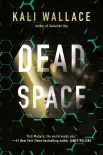Dead Space Kali Wallace (best non fiction books to read txt) 📖

- Author: Kali Wallace
Book online «Dead Space Kali Wallace (best non fiction books to read txt) 📖». Author Kali Wallace
The first thing I saw was that the surface of Nimue around me was no longer flat and featureless. The bulky structure of the UEN base was in view. It looked like a dull gray box set down on the asteroid’s surface at an angle, as though half of it had sunk into the regolith. Beyond the box were three towers. I recognized the shape of them from history books, from memorial parks on Yuèliàng: they were missile silos. I had no sense of scale, no sense of how tall they were, nor how far away. How insufferably bloody stupid it had been, for the UEN to build missile silos all the way out here, so far from Mars and the inner system battles. How scared they must have been, to think the war would stretch this far. Scared or greedy or bloodthirsty or some sick combination of them all.
However pointless its origin, it was a relief to see the base so close. I might have been able to drop my gaze again, to keep going, if I hadn’t also looked at the stars.
Above the dull gray surface of Nimue was the darkness that wasn’t sky because there was no sky here, specked with lights so small and so distant they might have been motes of dust, and the great size of the darkness, the crushing cold of it, it hit me with a wave of vertigo so strong I felt it as a physical blow, as though the asteroid was tumbling beneath my feet, the tracks bucking. I turned, dizzy, and sank to my knees, accidentally missed the edge of the track and plunged my right hand several centimeters down to the surface instead.
I squeezed my eyes shut, twisted in that awkward position, willing the vertigo away. My stomach was churning and my heart was pounding, and I felt suddenly, painfully hot all over, sticky and prickling and so feverish it was frightening. I shifted, thinking I ought to stand, but the surface of Nimue was soft, not solid rock, and my hand only sank deeper when I moved. I leaned to the left, clutched at the metal track with my metal fingers until I had a seam to grip, and pulled myself upright again.
I squeezed my eyes shut and I breathed, and breathed, and remained still, and breathed.
It was a long time before I could open my eyes.
My clumsy fall and even more clumsy recovery had kicked up a gritty cloud around me. The dust didn’t settle; it hung like a fog, obscuring my view, wrapping me in a dull gray shroud. I tried to keep my gaze down as I stood, to look at only the cargo rails beneath me, but I could not forget the darkness above. I knew it was there, and a single wrong step would send me spinning into it, drifting away with nothing to tether me, a trail of dust clinging to my boots. I could not stop thinking about how small Nimue was. How little there was of it, that hideous lumpy potato tumbling through space. I couldn’t breathe. There was no air in the suit. I couldn’t breathe and it was a bloody stupid way to die.
I took in deep, shuddering breaths. I took small steps. I kept moving. I did not stop until the entrance to the grim gray bunker loomed before me.
There was no control panel, no electronic input, no place to try an access code or employee ID. There was only an old-fashioned light signal above the door: red for pressurized, green for depressurized. The light shone red. I dug the key out of my pack and looked for the slot. I hadn’t noticed before how the dull gray metal was smudged with blood.
There it was, labeled for everybody to see: AIRLOCK MANUAL. Apparently the company, or Sigrah, didn’t trust the AI that reigned behind that door to control its own perimeter. I inserted the key and turned it. For several seconds, there was no reaction.
“Come on, come on,” I muttered. I had no idea what I would do if it didn’t work. “Come on, fucker.”
Then the door began to tremble. The key turned in my hand; I let it go quickly. There probably would have been noise, had there been any air to transmit it. Instead I felt only a faint shuddering quiver when I touched the metal. Several seconds passed before the light turned to green.
I opened the hatch and stepped inside.
TWENTY-ONE
On the other side of the airlock: nothing but darkness.
I closed the inner hatch—it made a deafening clang—and held my breath. The echoes faded. The airlock pinged and clinked quietly. There were no other sounds. The only light came from the airlock indicator above the door, and that was a muted green, illuminating nothing.
I checked the suit’s readout of atmosphere conditions. Breathable air at a normal pressure. Still I hesitated to take off my helmet. I wasn’t feeling particularly trusting. But the suit had limited peripheral vision and an internal speaker that crackled every time I turned my head. I needed to hear and see what was around me. I removed my helmet but left the rest of the suit on. The air on my face was cool and dry, stirred by a faint current.
The silence was deeply unsettling. I couldn’t even hear the usual station hum. There was simply nothing.
I switched on my flashlight. The floor ended abruptly about three meters ahead. There was no railing, only a drop into a deep, deep darkness. The light was just





Comments (0)